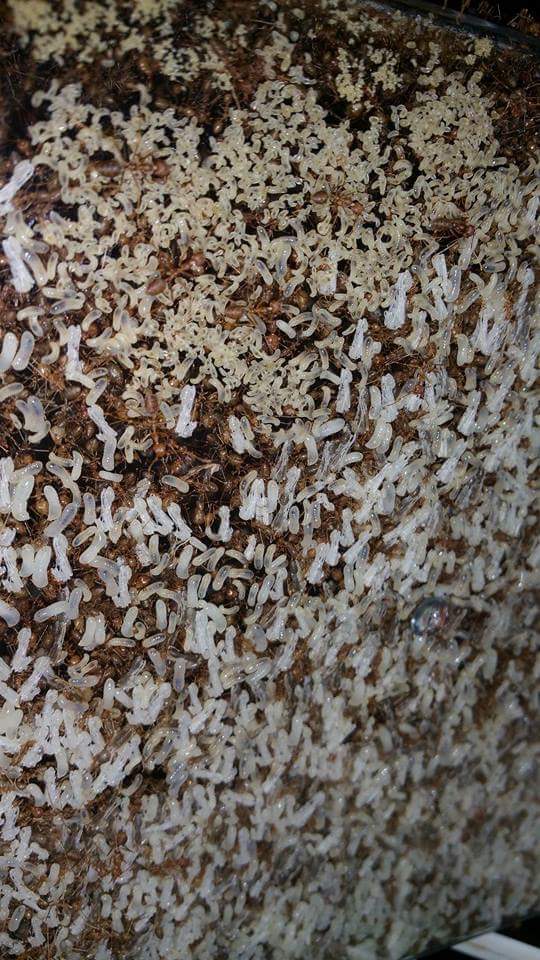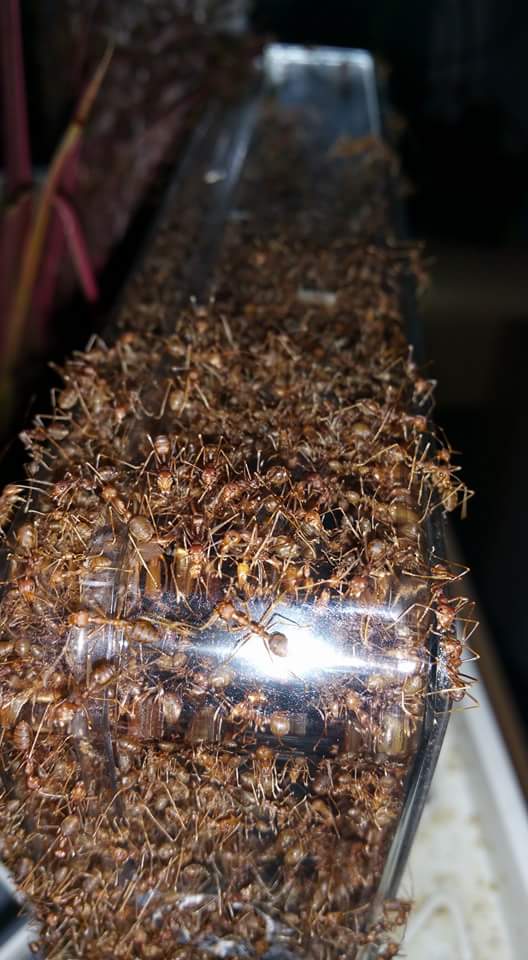- Formiculture.com
- Forums
- Gallery
- Members
- Member Map
- Chat

Weaver ants
Started By
silver tail
, Sep 13 2015 6:52 PM
8 replies to this topic
#1
 Offline
-
Posted September 13 2015 - 6:52 PM
Offline
-
Posted September 13 2015 - 6:52 PM
#2
 Offline
-
Posted September 13 2015 - 7:09 PM
Offline
-
Posted September 13 2015 - 7:09 PM
Hi! I plan on keeping these ants! Those pictures look really amazing- I like how your set up allows you to see into the colony, this is the type of thing I am considering to implement also. Your colony looks like it is thriving and very healthy!
I am interested in how people in Asia who farm these ants house them as I think their conditions will help me be successful with this species.
Have you managed to keep these ants for a long time? So many people report their colonies die after only one year. I think I read on a Netherlands and French ant forum that as they get older these colonies become more delicate, hence the need to rethink their husbandry requirements and consider methods similar to those employed by the ant farmers. With the farmers these ants are able to build large nests in plastic bottles perforated with holes that allow the bottles to breathe much like the leaves breathe in nature; allowing the ants to regulate the humidity inside the bottle. Maybe this allows delicate older colonies to survive in captivity more successfully, unlike with test tubes which can dry out or get too humid easily. Maybe the ants don't cope well with sudden humidity changes, and that explains why test tube colonies don't last long.
Do you mind if I ask, how large is the container you house these ants in? I am currently investigating suitable containers to house any possible future colony, and am unable to determine how much space they will need.
In the wild these colonies grow very large and like to have a choice of multiple nesting sites; but I wonder if that is necessary to their success in captivity or if it has a bearing on why the ant farmers are more successful with these ants.
Edited by Kit, September 13 2015 - 7:26 PM.
Enjoying a tall, cool glass of Soylent Green in the good ol' United States of Mexico and the Levant.
#3
 Offline
-
Posted September 13 2015 - 8:32 PM
Offline
-
Posted September 13 2015 - 8:32 PM
I have not keep them for too long, but they are multiplying in an alarming rate.
ThEuropean nature of life isn't like ants who stay underground. So they can't be kept in something like formacarium.
They need open air and they need to travel and climb to be healthy.
From what I heard, when the condition isn't suitable, they will start to get restless, try yo escape and start to kill each other or kill their queens.
ThEuropean nature of life isn't like ants who stay underground. So they can't be kept in something like formacarium.
They need open air and they need to travel and climb to be healthy.
From what I heard, when the condition isn't suitable, they will start to get restless, try yo escape and start to kill each other or kill their queens.
- Kit likes this
#4
 Offline
-
Posted September 13 2015 - 8:49 PM
Offline
-
Posted September 13 2015 - 8:49 PM
Hi silver tail.
That is really interesting....although kind of worrying too!
So they need a lot of ventilation, room to explore, and multiple nesting sites to choose from so they can move to a more suitable site if they don't like their current one? That is going to be hard to replicate on a small scale in my house. What a shame they have to be so difficult to care for!
There was a study done on these in Thailand where researches placed plastic bottles on trees inhabited by weaver ants and it was found the ants preferred to move into the bottles in some instances. Maybe they like these kind of enclosed environments and that plastic bottles would be something I could use to provide multiple nesting sites in my set up.
Here is that study http://www.asian-myr...enberg-2014.pdf
Do you mind if I ask, what are you feeding yours to make them so prolific?
Enjoying a tall, cool glass of Soylent Green in the good ol' United States of Mexico and the Levant.
#5
 Offline
-
Posted September 13 2015 - 8:49 PM
Offline
-
Posted September 13 2015 - 8:49 PM
In the wild, one good thriving healthy colony can spread through several hundred of metres. They travel through branches and through the ground. A large enough colony can take down a snake.
So far best plastic container is about 15 cm in diameter. But I'm using rectangular plastic box so I can see the activities properly.
They thrive without queens too. The workers are able to lay eggs. Just that it's is slower and they will never be stable without a queen.
So far best plastic container is about 15 cm in diameter. But I'm using rectangular plastic box so I can see the activities properly.
They thrive without queens too. The workers are able to lay eggs. Just that it's is slower and they will never be stable without a queen.
#6
 Offline
-
Posted September 13 2015 - 9:03 PM
Offline
-
Posted September 13 2015 - 9:03 PM
Hi kit...Yes...they are placed in an open area where they have access to small trees. I set a boundary of their range of travel. So they do not travel randomly around the house.
They do make small nest on the small tree. The queen nest is located on the tree. And the 1st picture that I post is the nest where they stores their eggs and larvae.
The 2nd picture is the container where they store their food.
So they set every nest for different purposes.
The Queens nest is usually the highest and the most guarded nest
They do make small nest on the small tree. The queen nest is located on the tree. And the 1st picture that I post is the nest where they stores their eggs and larvae.
The 2nd picture is the container where they store their food.
So they set every nest for different purposes.
The Queens nest is usually the highest and the most guarded nest
#7
 Offline
-
Posted September 13 2015 - 9:30 PM
Offline
-
Posted September 13 2015 - 9:30 PM
Wow sounds like you have a very elaborate set up for these ants! The way the use each different nest to place different items means they probably need to have multiple nesting sites to thrive in captivity.
Interesting the Queen is placed at the top and in the tree...it sounds like it would be difficult to tell if a Queen was still alive if the workers decided to start laying eggs. These ants seem really complicated.
I was thinking of housing mine in a Exo Terra Flexarium, do you think this would be appropriate? It's the only way I can think to give them space, and ventilation, while keeping them easy to manage. I was thinking of mounting transparent plastic containers on the inside on the Flexarium so you could see into the nests through the mesh.
http://www.ebay.com....=item419abc5c24
Edited by Kit, September 13 2015 - 9:40 PM.
Enjoying a tall, cool glass of Soylent Green in the good ol' United States of Mexico and the Levant.
#8
 Offline
-
Posted September 13 2015 - 9:45 PM
Offline
-
Posted September 13 2015 - 9:45 PM
In the wild, One colony can have hundreds of nest
That flexarium won't be able to hold much ants
That flexarium won't be able to hold much ants
Edited by silver tail, September 14 2015 - 12:28 AM.
#9
 Offline
-
Posted September 15 2015 - 1:10 AM
Offline
-
Posted September 15 2015 - 1:10 AM
I just noticed your clear plastic containers have no holes poked in them. And neither did the plastic bottles used in that study. So perhaps these ants are ok living in a container that stays humid as long as they are able to build their corridors of silk? It's just interesting that the Indonesian ant farmers puncture the plastic bottles with holes, while in the wild the ants will move to a plastic bottle with no holes all on their own. Perhaps this is proof that this method could be a successful way at keeping them alive longer in captivity?
So far I have only purchased two small critter keepers( about 15cm long) to house two Queens in and will transfer them to a larger Flexarium if they survive one year in captivity.
If your colony is growing too large maybe try feeding them protein every second week and see if that causes the colony to stabilize? Thanks again for sharing all your insider tips on these ants, I really appreciate learning new stuff about them.
Enjoying a tall, cool glass of Soylent Green in the good ol' United States of Mexico and the Levant.
0 user(s) are reading this topic
0 members, 0 guests, 0 anonymous users














